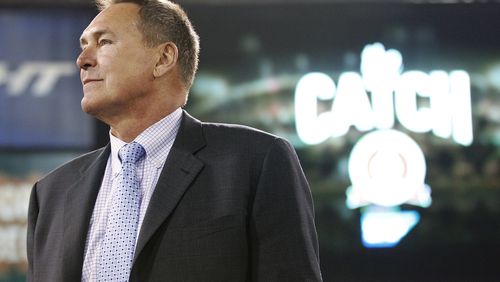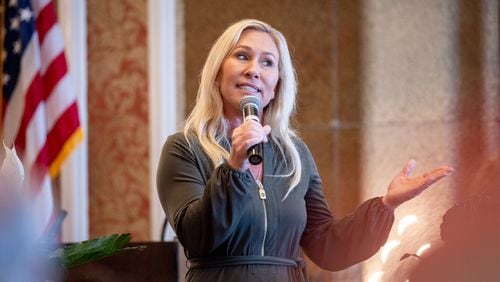First came news that Gale Sayers, one of the more graceful athletes ever to carry a football, suffers from dementia so severe that he gives blank stares when asked to sign his own name.
Then we heard Dwight Clark, whose strong hands gripped more than 500 receptions in his career, including arguably the most memorable in NFL history, struggles today to button his shirt because of ALS.
Two Hall of Famers. Two icons. Two of the greatest performers and ambassadors the NFL has ever had, now struggle to find a memory or to open a sugar packet. If the NFL doesn’t get it now, it will never get it.
“Even if the league pays attention, they’re not going to do anything,” said former San Francisco lineman Randy Cross, a teammate of Dwight Clark’s for nine years and two Super Bowls. “They’ll throw a couple of million at it, make it look good, have a nice press release. Players have to be more proactive about this.”
There’s an expression: Put your money where your mouth is. Cross is putting his brain there.
He is among 30 former NFL players who’ve pledged to donate their brains to the Concussion Legacy Foundation, which studies the long-term effects of concussions and head injuries in search of links to degenerative brain diseases: chronic traumatic encephalopathy (CTE), amyotrophic lateral sclerosis (ALS), dementia, Parkinson’s, Alzheimer’s.
Cross estimates he suffered more than 20 head injuries that were construed as concussions before retirement in 1990, but adds: “Back then, a concussion was when you got knocked out. What now qualifies as a concussion, I couldn’t even tell you how many of those I had, including practice. Before, if an ammonia cap made you flinch, you couldn’t be that hurt.”
At 62, he's one of the fortunate ones who hasn't shown any long-term effects of head injuries. But he believes donating a relatively healthy brain can answer as many questions as one from a player who suffered from CTE or similar. As he wrote in a recent first-person piece on The Players Tribune, "We as former players own the ultimate study material for scientists. So it just doesn't feel right to withhold it from people who actively are searching for a solution."
Like many of Clark’s teammates, Cross has known about the ALS diagnosis since July. It hit him like a punch to the gut, as it would anyone who has known Clark off the field.
Include me in that group. I covered the 49ers when I lived in San Francisco in the mid-to-late 1980s, and he was as popular with media members as he was teammates because of his humility and self-effacing humor, despite his legendary stature and the fact he made the most famous reception in franchise history: “The Catch” against Dallas in the NFC Championship game in January 1982.
I recall having a conversation with him one day in the cafeteria in training camp and at one point he turned to me, puzzled by a word I used, and said, “Hey man, I went to Clemson.”
As an athlete, he was the ultimate overachiever, 10th-round draft pick who turned himself into a two-time All-Pro and Joe Montana’s favorite receiver. He was 6-foot-4, but not especially strong and certainly not fast. He loved running routes in the soft part of Candlestick Park called “the swamp,” where loose, wet sod covered the infield.
“He’d say, ‘We’re all the same speed in the swamp,’” Cross said, laughing.
The day after a story on Sayers’ dementia appeared in the Kansas City Star, Clark announced his ALS diagnosis on Twitter. He said he didn’t “know for sure,” that football caused his disease. “But I certainly suspect it did.”
He pushed for efforts by the league and players’ union to make the game safer and continue research on the effects of head trauma.
The NFL was accused in a class-action lawsuit of covering up possible links between head injuries and CTE. It settled for an estimated $1 billion. In the settlement, it stated the class was approximately 22,000 former players and estimated “more than 6,000” will need to tap into the funds.
That's only the players who were named in the class. It's logical to assume there will be thousands more who did not join the lawsuit. The NFL and sports world must brace for more high-profile cases, joining the likes of Mike Webster, Junior Seau, Frank Gifford, Kevin Turner, Steve Gleason, Dave Duerson and former Falcons Shane Dronett and Ray Easterling. (Duerson, Dronett and Easterling committed suicide after struggling with their diseases.)
If the NFL is finally responding, it’s only because it has received so much negative attention for its past inaction. And lies.
Retired NFL commissioner Paul Tagliabue said he now regrets calling out the media for attention given to head injuries, attributing it to “pack journalism” and saying, “There is no increase in concussions, the number is relatively small, the problem is the journalist issue.”
It was equally bad when the NFL pretended to be concerned about the issue one minute, then celebrate concussive hits the next in highlight tapes. But the league is finally taking steps to make the game safer, mandating arm and shoulder tackling and penalizing players for hits to the head. Seattle coach Pete Carroll was at the forefront of teaching rugby-style tackling, which Falcons coach Dan Quinn brought with him to Atlanta.
But the league needs to do more to fund research. Cross, who has been outspoken for years on concussion issues, believes the NFL and NFLPA should fund “the lion’s share of the research,” along with the Department of Defense.
Cross doesn’t fear for the NFL’s future. But it’s hard to ignore the increasing number of players who are walking away from the game early, from former Georgia Tech star Calvin Johnson to New England center Bryan Stork. As awareness grows, more players are considering life after football.
“I love football deeply,” Cross said. “But maybe it should be treated like boxing and MMA.”
Cross will see Clark this weekend at a DeBartolo Foundation fundraiser in Tampa. He’s familiar enough with ALS to know what to expect, but seeing him struggle won’t be easy.
“Dwight’s such a high-energy positive kind of guy,” Cross said. “That will serve him well moving forward.”
About the Author






